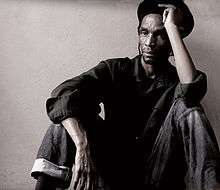Lesego Rampolokeng
| Lesego Rampolokeng | |
|---|---|
 | |
| Born | 1965 |
| Occupation | Poet, writer, musician and artist |
| Nationality | South African |
Lesego Rampolokeng (born 7 July 1965) is a South African writer, playwright and performance poet.
Early life and education
Lesego Rampolokeng was born in 1965 in Orlando West, Soweto, Johannesburg. He studied law at the University of the North in South Africa, but he has not followed this path any further.[1][2]
Works
Lesego Rampolokeng came to prominence in the 1980s, a very turbulent time in South Africa. His poetry often criticises the establishment. His first instalment of poetry was Horns for Hondo (1991) and this was followed by End Beginnings (1993). Lesego collaborates with musicians. He has performed in many countries and with musicians such as Julian Bahula, Soulemane Toure, Louis Mhlanga and Gunther Sommer. He collaborated with the Kalahari Surfers on the track "The Desk," found on the album End Beginnings.[3]
He is directly influenced by the writings of Frantz Fanon and he comes from the Black Consciousness era of the 1970s and 1980s. Horns for Hondo (1991, COSAW) launched Rampolokeng's writing career. He is influenced by Ingoapele Madingoane, Matsemela Manaka and Maishe Maponya.[4] Ingoapele Madingoane in particular had an immense influence on Rampolokeng becoming a writer.
In one of his poems he claimed to "shoot the English with bullets that are British". In another piece of work, "Riding the Victim's Train" (on the CD / album The H.a.l.f Ranthology), Rampolokeng calls himself "a leper cast out in the desert, and cold, without a snout or paw in the pot of gold".
He has shared a stage with local and international poets including Kgafela oa Magogodi, Lefifi Tladi, Lebo Mashile and Natalia Molebatsi. Some academics and critics have compared Rampolokeng to the late Dambudzo Marechera because of his non-complacent and often confrontational writing.[5] Rampolokeng appears in the documentary Giant Steps (2005), directed by Geoff Mphakati and Aryan Kaganof.[6] He participated in the 2001 Poetry International Festival in Rotterdam.[7]
Poetry
- Horns for Hondo (COSAW, 1990)
- End Beginnings (Shifty CD with the Kalahari Surfers, 1993)
- Talking Rain (COSAW, 1993)
- Rap Master Supreme - Word Bomber in the Extreme (1997)
- End Beginnings (English-German) (Marino, 1998)
- Blue V's (English-German; with CD) (Edition Solitude, 1998)
- The Bavino Sermons (Gecko Poetry, 1999)
- The h.a.l.f. ranthology (CD with various musicians, 2002)
- Head on fire - Rants/Notes/Poems 2001-2011 (Deepsouth 2012)
- History
Plays
- Fanon's Children
Novels
- Blackheart (Pine Slopes Publications, 2004)
- Whiteheart (deep south publishing, 2005)
References
- ↑ "Interview with Lesego Rampolokeng | A poet, irresistibly fighting for "a world in which all can breathe"". SÜDAFRIKA – Land der Kontraste. 7 February 2011. Retrieved 14 February 2013.
- ↑ "Rap-Master in the extreme" —biography of Lesego Rampolokeng on Culturebase.
- ↑ "Consumer Guide". Robert Christgau. 19 October 1993. Retrieved 14 February 2013.
- ↑ These are the writers that he singles out in his interview with Y-Fm, a youth radio station in Johannesburg. This interview is in his CD H.A.L.F Ranthology.
- ↑ Flora Veit-Wild, "Carnival and hybridity in texts by Dambudzo Marechera and Lesego Rampolokeng", Journal of Southern African Studies 23(4):553-564, December 1997.
- ↑ Giant Steps, by Geoff Mphakati and Aryan Kaganof, 2005, (52min, DVCam, South Africa. A documentary portrait of revolutionary poets Lefifi Tladi, Lesego Rampolokeng, Kgafela oa Magogodi, Afurakan, Mac Manaka with music by Johnny Mbizo Dyani and Zim Ngqawana.
- ↑ Biography of Lesego Rampolokeng on Poetry International Festival Rotterdam, 2001.
External links
- Article on Poetry International Web
- Lesego Rampolokeng at culturebase.net